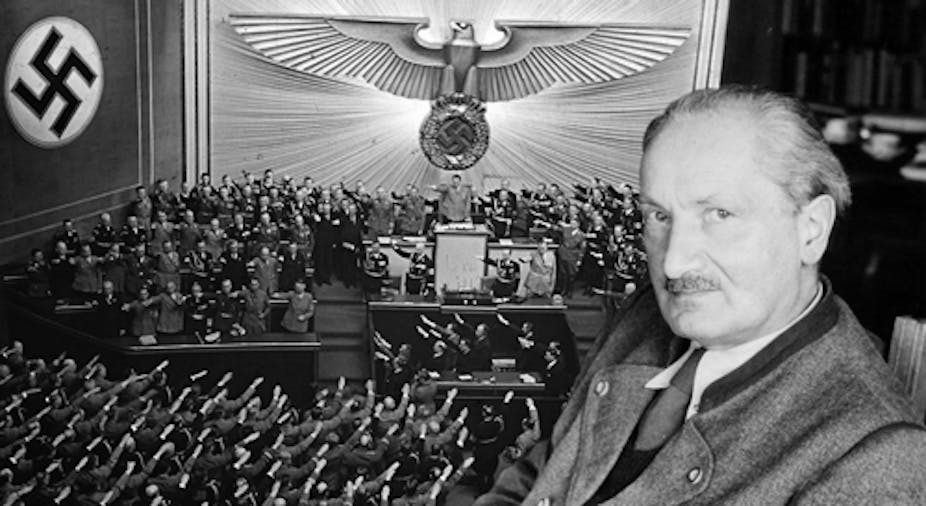Martin Heidegger (1889-1976) is easily the most controversial philosopher in the 20th century. To a large extent this is due to his implication in Nazism, which is a scandal to some, a fascinating spectacle to others and an intellectual dilemma for many a serious reader of Heidegger’s texts. The inevitable question is whether Heidegger’s Nazism infected his philosophy.
Heidegger’s support for the Nazis is well known and has been meticulously documented. Six years after publication of Being and Time, Heidegger joined the NSDAP and was elected rector at the University of Freiburg in 1933. In that role he gave a number of speeches in support of the new regime and wrote denunciatory letters about liberal and left-leaning colleagues.
After World War Two, Heidegger was suspended from teaching duties for five years because of his involvement with the Nazis. He retired in 1951, but continued to give lectures and seminars. He also prepared the publication of his Collected Works, or Gesamtausgabe, now projected to reach 102 volumes.
While every year new articles and books come out interpreting Heidegger’s implication in Nazism, it is rare that new writings by Heidegger himself shed light on this topic. But in March, the first of Heidegger’s previously unpublished Black Notebooks, or Schwarze Hefte, were released as volumes 94, 95, and 96 in the Gesamtausgabe. These notebooks contain reflections, observations and sketches from 1931 to 1941.
Anti-Semitism writ plain
In these notebooks Heidegger is caught red-handed employing classical anti-Semitic stereotypes. For instance, at one point he speaks of the characteristically Jewish gift for “calculation”, which would then find an ideal foothold in “the empty rationality and calculative bent” of Western metaphysics, especially since Descartes.
Heidegger goes on to relate this to Edmund Husserl, his erstwhile academic teacher. Although he carefully acknowledges the “lasting” merits of Husserl’s philosophy, Heidegger insinuates that Husserl ultimately failed to penetrate to the ground of philosophy, the question of Being, because of his Jewish or calculative rationality.
Elsewhere Heidegger holds that, given “their talent for calculation”, Jews have lived longer than anyone else “by the principle of race”. With superadded malice, he writes that this is why they “resisted its universal application”.
In other passages, Heidegger apparently buys into the myth of a Jewish conspiracy. He notes that whereas “world Jewry” could augment its powerbase without resorting to warfare, Germany was forced to sacrifice “the best blood of the best of its people”.

There is no question, then, that at least for some time Heidegger held stereotypical anti-Jewish sentiments. For some this proves that Heidegger committed “crimes of thought”, Gedankenverbrechen, disqualifying his work as part of the canon of serious philosophy. Others have followed suit and proclaimed their intention to abandon the study and teaching of Heidegger.
Some more cautious commentators have pointed out that “not everything hangs together with everything”. They argue that it is a mistake to use Heidegger’s occasional anti-Semitic remarks in the Black Notebooks as the golden thread for interpreting his philosophy.
Philosopher Jeff Malpas notes that:
…the nature and significance of Heidegger’s thought cannot be determined by selective quotation from his work nor by a focus on the shortcomings of Heidegger the man. If it is his philosophy that is at stake here, then it is with his philosophy that we must engage - and there are no shortcuts to doing that.
Public joins philosophical debate
The discussion about Heidegger’s Black Notebooks is no longer confined to academic philosophy. It is widely discussed in national newspapers, magazines and talk shows in France, England, Germany, Switzerland, the US and Canada. A theatre in Germany is selling tickets for a public reading from Heidegger’s Black Notebooks this month.
One wonders whether this is a sign that we actually live in philosophical times. Is it perhaps a last-ditch attempt to exorcise the corrupting influence of bad philosophy once and for all? Or is it a cheap move to cash in on a brewing scandal as long as it lasts? In a sad irony, Heidegger scathingly attacks “idle talk” or prattle, Gerede, but is now the object of one talk show after another.
Philosophically speaking, it would be absurd to brush aside or take lightly Heidegger’s anti-Semitism in the Black Notebooks. But it is surely hopelessly reductive to focus on roughly two pages with incriminating remarks while ignoring the other 1243 pages. Heidegger is neither obsessed with anti-Semitic ranting and raving, nor is his philosophy based on anti-Semitic slurs.
The contents of the Black Notebooks can be grouped under three headings:
some personal reminiscences - these include the open admission of the failure of his political engagement in 1933;
philosophical comments on current affairs broadly conceived - the state of the university, the prospect of education and culture at large, the role of science and philosophy, the rise of modern technology and the political manufacturing of a cultural heritage, National-Socialism, Bolshevism, the fate of Christianity, the looming Second World War and the devastation of the planet;
sketches of his own contributions to philosophy, the History of Being, freed from its earlier subjectivist cast in Being and Time, and under the newly found auspices of Friedrich Hölderlin’s poetry.
A comprehensive review would have to acknowledge that the Black Notebooks show that from around 1934 Heidegger moves away from his earlier enthusiasm for National-Socialism. He eventually saw in it a form of aggressive technological modernity. Heidegger also rejects the Nazi concept of race as a meaningful characteristic and vehemently opposes any biological reductionism.
On the other hand, it is obvious how under-prepared Heidegger is to analyse political phenomena. For instance, he claims to find the origins of Bolshevism in British parliamentary democracy.
Future research will focus on Heidegger’s philosophical gamble to pursue the question of Being outside hermeneutical phenomenology. The Black Notebooks show that abandoning any foothold in inter-subjectively shared and secured intelligibility comes at a great cost.

